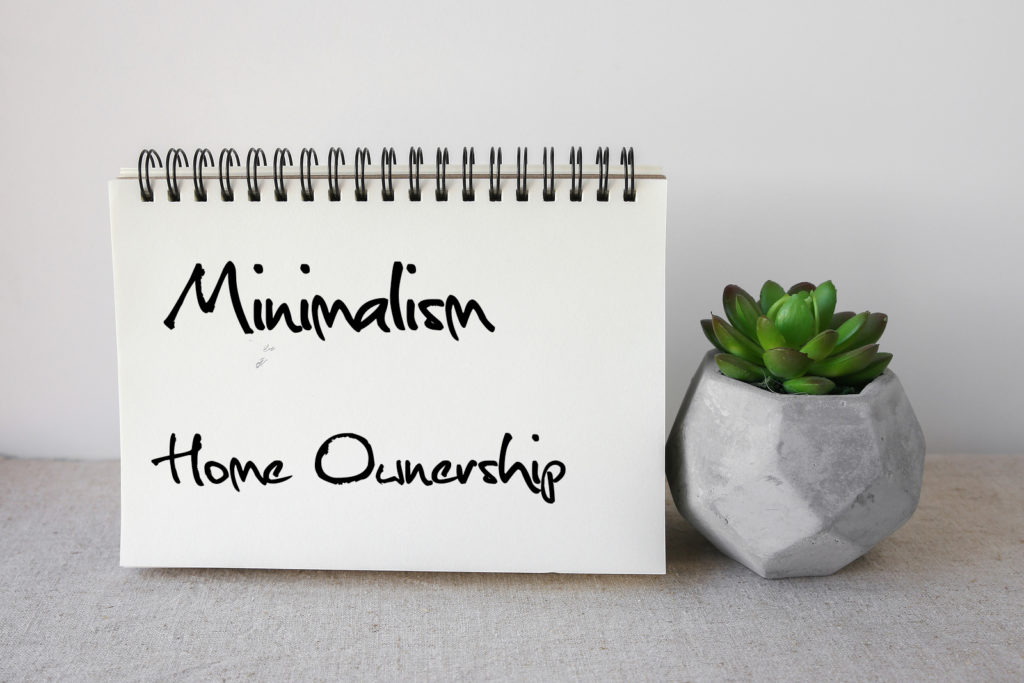
Have you ever listened to the podcast The Minimalists?
I am a huge fan of the Minimalists and their views on most things. Minimalism is really just a state of mind and can be applied to so many facets of one’s life. It doesn’t have to encompass living like a monk with zero possessions, or not driving a car, or only eating a vegan diet, it can mean many different things to many different people. The key takeaway is living with purpose, authenticity, and intentionality. In essence, it is not succumbing to our corporate consumer culture and its trappings of extreme debt.
Minimalism relates to housing in many ways. One of the only things that is universally required by every human being is a roof over our head. You don’t actually need the latest iPhone X or fancy new car lease, or endless collectibles or chotchkies that seem to clutter our lives. So minimalism can certainly cover areas like decluttering, setting up your space, organization of your home etc.
Minimalism can also relate to where you decide to set up your abode, your neighborhood, i.e. close to your needs like work, grocery etc. You can certainly live more simply by not spending huge amounts of time commuting to work, perhaps you could even walk or bike.
Minimalism can influence what type of abode you decide you need or want. If you live “smaller” you can probably buy a nicer place in a nicer neighborhood.
But, my topic for this post is about how Minimalism relates to home ownership. If minimalism is about simplicity and being debt-free, then how do the minimalists feel about home ownership? Well, like most topics it’s complicated but after listing to The Minimalists podcast #058 entitled “Home” I can say that I do not agree with the views espoused, at least in the Denver area, and I’ll tell you why.
Some of the Minimalists views on buying a home from this podcast:
- Should have at least a 50% down payment
- Should be able to purchase a home with a 7 year fixed rate mortgage
- Live in the home/city for at least 7 years
- Bare minimum to put down is 20%, longest mortgage term is 15 years, but work hard to pay mortgage off early
- The Bank owns the house, not you
- Your own personal house is not an investment. Rental properties are investments.
- Renting is “owning” the ability to be mobile
Here’s the problem with this advice and I will break down each point: This may work in some cities or areas where the real estate is very inexpensive. Sure, if you move to Buffalo NY and buy a home for $40,000 maybe you can make these numbers work, but the home will most likely never go up in value as Buffalo is a net-demand declining city, and in that case you should probably just always rent in a city like that.
- Should have at least a 50% down payment
Most people will never be able to buy a home with 50% down because they can’t save that much. It’s just not feasible, especially for younger people saddled with student loan debt and low-paying jobs where saving is difficult. Also this seems like an arbitrary number, although I think where they are coming from is that no form of debt is good, so the less financed with the bank the better. The banks themselves have set the magic number at 20% down, which the number at which you will get the best rates, the best mortgages, with no mortgage insurance requirements.
- Should be able to purchase a home with a 7 year fixed rate mortgage
This would be great if it were possible. Who wouldn’t love to pay off a house in 7 years? But for most people the payments on a mortgage like this would be huge, probably more than their entire take home money, because the cost of homes in Denver is now on average over $400,000 for a single family home. In order to qualify for a 7 year fixed rate mortgage on a average $400,000 home you’d probably need to be making >$300,000+/year to qualify for the payments.
- Live in the home/city for at least 7 years
Again, this seems rather arbitrary. I like the idea of thinking long term, not speculating on any investment, real estate included, so I like the longer term view here, but you also need to consider the market and the fundamentals. In an appreciating market like Denver, or any market really, your horizon should be at least two years, maybe 3-5 minimum, but I wouldn’t necessarily set the number at 7, because as mentioned it seems arbitrary and if you are in your 20’s or 30’s, 7 years is a long period of time in which your life circumstances can change dramatically, but this doesn’t necessarily mean you should rule out buying a home and starting to accumulate wealth through ownership.
- Bare minimum to put down is 20%, longest mortgage term is 15 years, but work hard to pay mortgage off early
I tend to agree with this, and both homes my wife and I have bought we put down 20%. This got us the best rate, terms, and no mortgage insurance premiums. I do not agree with the 15 year period for the reasons of leverage, interest rates, and spread. For instance, let’s say you can borrow money for 30 years at 4%, or 15 years at 3.5%. Take the extra money you did not commit to your down payment and invest it, shooting for 6-8% return, and that is liquid money that you can tap for other purposes whereas equity in your home is harder to tap. Lastly, there is not pre-payment penalty on most mortgages, so get a 30 years mortgage and lower monthlies than a 15, and then if you want to pay it off early with your bonuses or as you get raises, great idea. Maybe you can pay it off in 15 years. However, if you lose your job, you only have to make the lower monthly payment of the 30 year. It’s just a lot more flexible and using leverage is a more sophisticated strategy than a myopic approach of debt=bad.
- The Bank owns the house, not you
This is not true. The Bank owns the note, and the mortgage instrument. The Bank owns the debt. That’s like saying that you bought a couch on a credit card but that Capital One owns your couch. Not true. If the Bank owned the house, then they could sell it at any time or change the terms on you. You own the house even if you have a mortgage. You are entirely free to upgrade, change, sell, control, use, enjoy your home in any way you want. You alone are listed on the Deed of the home, not the Bank. You control the asset in every way even if you have a lien against it.
- Your own personal house is not an investment. Rental properties are investments.
This is a topic for a its own post since its so complex. Overall in the USA, your home is probably not a good “investment.” Homes values overall in the USA historically (last 50 years) have not appreciated at all when adjusting for inflation, whereas the stock market, even when adjusted for inflation, has returned over 6% historically. Throw in depreciation, maintenance costs, transaction fees, the illiquidity of real estate, and your own personal residence is probably not a good investment. The one caveat to that is there are some niche cities, Denver being one, where the supply and demand has been so skewed, especially over the last 5-6 years coming out of the recession, that for many people their homes have in fact been a good investment. This is a prime example of how real estate is hyper local, and the Denver market is an outlier for sure in the overall US Real Estate market.
- Renting is “owning” the ability to be mobile
I can’t argue with this point, and if you are single, or married, but have few commitments to any one place and are at a place in your life where you value mobility, trying different cities or neighborhood, then renting is absolutely the way to go.
Conclusion
In some cases, purchasing a home can enable someone to live more minimally, more simply, more intentionally, because you are stripping away the uncertainty of renting/landlords, rent increases, locking in the same payment for up to 30 years, allowing you to possibly manage your finances better in the long term with the goal of being debt free at some point.
I absolutely love the discussion, as well as the tenets of Minimalism at large. Hopefully your takeaway can be that you can still apply minimalism to home ownership, but that Real Estate is hyper local, hyper niche, and what applies to Montana (where the Minimalists live) and the Denver area are entirely different, and one size does not fit all.




Leave a Reply